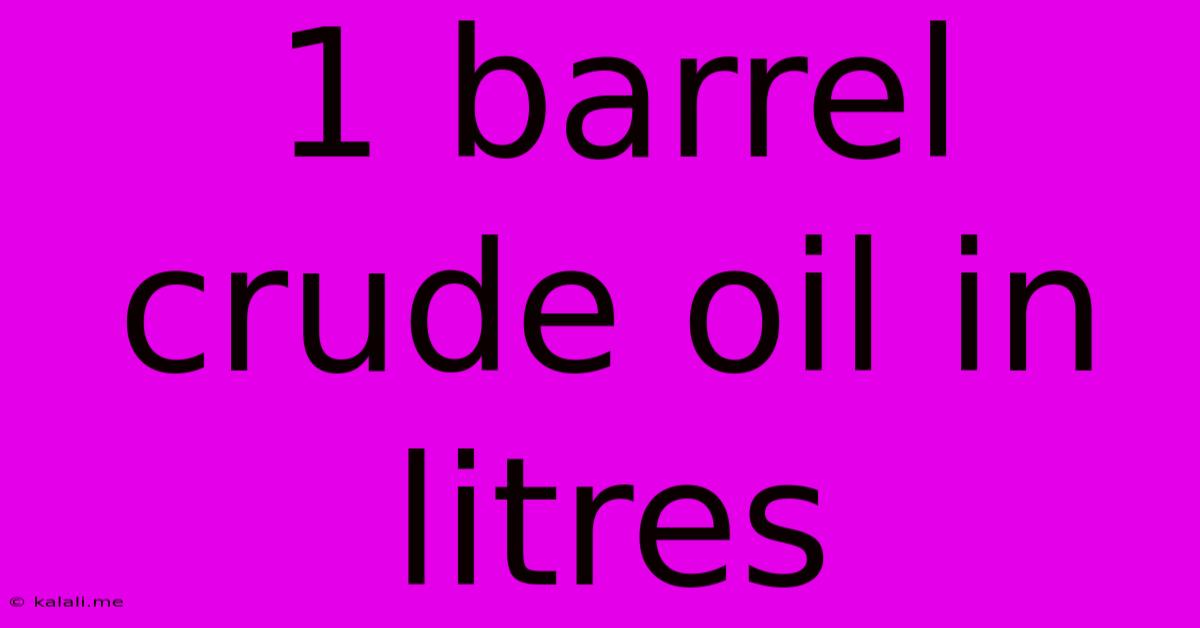1 Barrel Crude Oil In Litres
Kalali
Jun 15, 2025 · 3 min read

Table of Contents
1 Barrel Crude Oil in Litres: A Comprehensive Guide
Meta Description: Ever wondered how many liters are in a barrel of crude oil? This comprehensive guide clarifies the conversion, explores the history of the unit, and delves into its importance in the global energy market. Learn about the complexities and variations involved in accurate conversion.
The question, "How many liters are in a barrel of crude oil?" seems simple, but the answer requires a bit more nuance than a straightforward conversion. While the standard answer is widely accepted, understanding the underlying complexities ensures accurate calculations and a deeper appreciation of the global oil market.
Understanding the Barrel Unit
The oil barrel, a unit of volume, isn't a standard, precisely defined container like a liter or a gallon. Its origin traces back to the early days of the oil industry in the United States, where oil was initially transported in wooden barrels of varying sizes. Over time, the 42-US-gallon barrel became the industry standard, primarily due to its convenient size and historical usage.
Converting Barrels to Litres: The Standard Calculation
The widely accepted conversion factor is:
- 1 US barrel = 158.987 litres
This conversion stems from the relationship between US gallons and liters: 1 US gallon equals approximately 3.78541 liters. Therefore, 42 US gallons (one barrel) multiplied by 3.78541 liters/gallon yields approximately 158.987 liters.
Factors Affecting Accurate Conversion
While the above conversion is commonly used, several factors can influence the precise volume:
- Temperature: Crude oil's volume changes with temperature. Hotter oil will occupy a slightly larger volume than colder oil. Accurate calculations require accounting for the temperature at which the measurement is taken.
- API Gravity: The American Petroleum Institute (API) gravity measures the density of the crude oil. Lighter crude oil (higher API gravity) will have a slightly different volume compared to heavier crude oil (lower API gravity) for the same barrel measurement. This difference is usually negligible for most practical purposes, but precise calculations in trading and refining might require this adjustment.
- Measurement Method: The method used to measure the oil can introduce minor variations. Different measuring equipment and techniques may lead to subtle differences in reported volumes.
The Importance of Accurate Conversions in the Global Oil Market
Accurate conversion between barrels and liters is crucial for various aspects of the global oil industry:
- Pricing and Trading: Oil prices are usually quoted in US dollars per barrel. Precise conversions are essential for fair and accurate pricing in different markets using different volume units.
- Logistics and Transportation: Accurate volume calculations are vital for efficient planning and execution of oil transportation, storage, and distribution across the globe.
- Refining and Processing: Refining processes often require precise knowledge of oil volumes for optimal operation and yield.
Conclusion
While the simple conversion of 1 barrel to approximately 158.987 liters is widely used and generally sufficient, a deeper understanding of the factors influencing the conversion is beneficial. Precise calculations in the oil industry require considering temperature, API gravity, and measurement techniques for accurate results. This knowledge is vital for anyone involved in trading, transportation, refining, or any other aspect of the global energy market involving crude oil.
Latest Posts
Latest Posts
-
Which One Of The Following Is An Intensive Property
Jun 15, 2025
-
Radius Of The Moon In M
Jun 15, 2025
-
Which Of The Following Expressions Has A Value Of 4
Jun 15, 2025
-
What Does Xlv Mean In Roman Numbers
Jun 15, 2025
-
Ability Of A Material To Resist Deformation
Jun 15, 2025
Related Post
Thank you for visiting our website which covers about 1 Barrel Crude Oil In Litres . We hope the information provided has been useful to you. Feel free to contact us if you have any questions or need further assistance. See you next time and don't miss to bookmark.